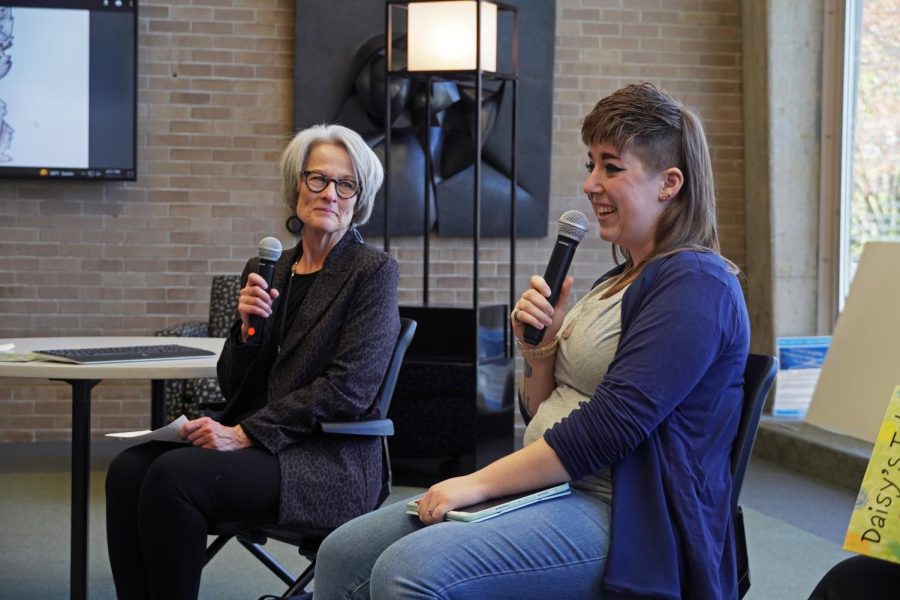Grinnell’s new police chief, Michael McClelland, has strong words when it comes to confronting racism in his police department, but as of now he has no specific plans to increase racial bias training or institute new department policies.
Speaking at a Grinnell League of Women Voters (LWV) forum held over Zoom on March 11, McClelland stated that, “If there’s any evidence that my cops are being racist … I’m going to fire them. Plain and simple.”
Audience-members were instructed to send in their questions to the new police chief – most of which were related to racial-bias and police-misconduct – to the LWV at least two days in advance. They were not allowed to ask follow-up questions unless permitted by the moderators.
A Des Moines native, McClelland moved back to Iowa after 24 years of service with the Aurora Police Department in Colorado to serve as Grinnell’s new chief of police, where his tenure began on Jan. 4, 2021.
Two years ago, in August of 2019, Aurora Police Department officers were involved in the death of Elijah McClain, a Black man who died in hospital a few days after police put him in a chokehold.
Prior to McClain’s death, the Aurora Police Department had a long record of allegations over racist violence and racial profiling. In 2018, the Colorado ACLU filed a lawsuit against the Aurora Police Department after the death of Jamie Torres, a Latino man who was injured by officers while responding to a noise complaint.
The lawsuit also detailed 13 incidents from 2003 to 2018 of what the ACLU described as “racial discrimination,” and alleged that the Aurora Police Department had “failed to properly train and supervise its officers to avoid the use of racially-biased policing.”
In December of 2020, the Aurora Police Department settled the lawsuit for $285,000 on behalf of Torres.
While McClelland’s service was not related to the McClain investigation, he worked as crowd control during Black Lives Matter (BLM) protests in Aurora as part of his duties as the supervisor of an emergency response team. One protest he worked at was a Violin Vigil held for McClain, which resulted in a class action lawsuit against the Aurora Police Department after citizens alleged that some police officers were using excessive force, although McClelland himself wasn’t accused of any misconduct.
Regarding his service in Aurora, McClelland said that McClain’s death was emblematic of a larger problem with racism in police departments across the country.
“What does [McClain’s death] mean to us here in Grinnell? …. It forces us as police officers to look first at our individual implicit biases, and how systemic racism can affect how we are policing,” he said. “In a nutshell: Black Lives Matter.”
The Grinnell Police Department began instituting implicit bias training in the summer of 2020 after being mandated by Iowa Gov. Kim Reynolds, but McClelland said he believes that police officers need more than just the few hours of training that the law mandates each year. However, McClelland did not answer whether he has plans to institute more implicit bias training for officers in the Grinnell Police Department.
When asked, McClelland also did not name any policies he was planning to put in place to reduce racial profiling in Grinnell. However, later in the forum he suggested the possibility of citizen-review panels, which could help the Grinnell Police Department to identify and address racism within its policing.
McClelland said that he appreciates BLM’s mission statement to end police brutality, stop systemic racism and for cops to have better training, but he does not agree with calls for reduced police funding.
“While I understand that they say we should take money and put it into the mental health areas, I don’t want money taken from the police department – we don’t have enough of it as it is for us to do our jobs,” said McClelland.
However, McClelland did add that addressing mental health crises is one of the top priorities for the Grinnell Police Department.
“Officers receive training in dealing with people with mental illnesses, but that doesn’t make them experts in it,” he said.
Grinnell’s new police chief said he would support a system like Aurora Police Department’s Crisis Response Team, which he saw in action during his time there. The program pairs a police officer and a mental health professional together when they are on duty so that both can respond to a call – but McClelland said he doesn’t know if this type of system is feasible for a smaller city like Grinnell.
In the future, McClelland plans to meet with the Grinnell Regional Medical Center and discuss how to handle mental health related calls in a way that is feasible for Grinnell. He also said that he hopes to have all his officers receive Crisis Intervention Training (CIT).
CIT is a type of scenario-based training which aims to teach law enforcement officers how to respond to mental health and medical emergencies. In the past, CIT training has been shown to reduce arrests of people with mental illnesses, and to decrease officer-injuries by up to 80 percent.
McClelland said his other top priority is responding to drug and alcohol addiction in Grinnell, and he said that he hopes to continue enforcement operations like drug confiscations via traffic stops, but also to expand drug-awareness education – such as the D.A.R.E. program (Drug Abuse Resistance Education) – within the Grinnell-Newburg Public School District.
Some studies have shown that D.A.R.E. programs are ineffective at reducing the usage of alcohol and drugs for teenagers, but McClelland was also open to the possibility of using other programs besides D.A.R.E. to reduce teenage drug usage.
“Instead of sending [addicts] to jail, we just need to get them the help they need,” he said, adding that the Grinnell Police Department will continue prior work with hospitals and rehabilitation facilities around Grinnell to provide effective care.
McClelland ended the forum by emphasizing his hope to build trust between law enforcement and members of the Grinnell community. McClelland encouraged any resident of Grinnell to reach out to him personally if they had additional questions or concerns about the police department in general.
He also urged anyone with any information regarding officers who may harbor bias against residents of color or other marginalized groups to issue a formal complaint – either with their name attached or anonymously – or to contact him personally so he can look in further.
This article was edited to reflect the fact that McClain died in hospital multiple days after his confrontation with the Aurora Police Department.




























































Prathik Gowda • Mar 17, 2021 at 5:05 pm
excellent article